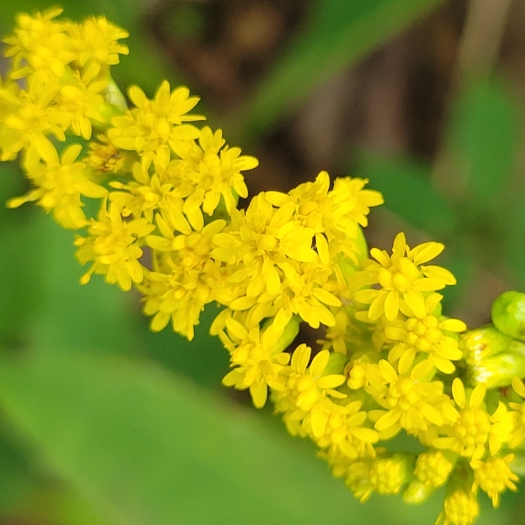Elliott’s Goldenrod
(Solidago latissimifolia)
Elliott’s Goldenrod (Solidago latissimifolia)
/
/

Matt Pelikan
CC BY 4.0
Image By:
Matt Pelikan
Recorded By:
Copyright:
CC BY 4.0
Copyright Notice:
Photo by: Matt Pelikan | License Type: CC BY 4.0 | License URL: http://creativecommons.org/licenses/by/4.0/ | Rights Holder: Matt Pelikan | Publisher: iNaturalist | Date Created: 2022-09-04T09:50:27-07:00 |

























Estimated Native Range
Summary
Solidago latissimifolia, commonly known as Elliott’s Goldenrod, is a perennial herb that is native to a variety of habitats including moist meadows, marsh edges, and open woodlands along the Atlantic Coast of the United States and Canada, from Nova Scotia to Alabama and Florida. It can grow up to an impressive height of 13 feet, though typically it is shorter, and features elliptical to lanceolate leaves. From late summer to fall, it produces numerous small, bright yellow flower heads arranged in large, showy plumes that are highly attractive to pollinators.
Elliott’s Goldenrod is valued for its tall, striking presence and vibrant yellow flowers that add late-season color to gardens and naturalized areas. It is often used in wildflower gardens, meadow plantings, and for ecological restoration projects due to its ability to attract a variety of pollinators and beneficial insects. This goldenrod prefers full sun to part shade and thrives in moist, well-drained soils. While it is generally low-maintenance, it can be susceptible to rust and mildew if conditions are too damp or crowded. It is important to note that while goldenrods are sometimes mistakenly blamed for hay fever, they are not the true culprits; that distinction belongs to wind-pollinated plants like ragweed. Elliott’s Goldenrod is also of conservation interest, being endangered in New York and a species of special concern in Rhode Island and Connecticut, which underscores the importance of planting native species to support local ecosystems.CC BY-SA 4.0
Elliott’s Goldenrod is valued for its tall, striking presence and vibrant yellow flowers that add late-season color to gardens and naturalized areas. It is often used in wildflower gardens, meadow plantings, and for ecological restoration projects due to its ability to attract a variety of pollinators and beneficial insects. This goldenrod prefers full sun to part shade and thrives in moist, well-drained soils. While it is generally low-maintenance, it can be susceptible to rust and mildew if conditions are too damp or crowded. It is important to note that while goldenrods are sometimes mistakenly blamed for hay fever, they are not the true culprits; that distinction belongs to wind-pollinated plants like ragweed. Elliott’s Goldenrod is also of conservation interest, being endangered in New York and a species of special concern in Rhode Island and Connecticut, which underscores the importance of planting native species to support local ecosystems.CC BY-SA 4.0
Plant Description
- Plant Type: Herb
- Height: 1.5-3 feet
- Width: 1.5-2.5 feet
- Growth Rate: Moderate
- Flower Color: Yellow
- Flowering Season: Summer, Fall
- Leaf Retention: Deciduous
Growth Requirements
- Sun: Full Sun, Part Shade
- Water: Medium
- Drainage: Medium, Fast
Common Uses
Bee Garden, Bird Garden, Border Plant, Butterfly Garden, Drought Tolerant, Erosion Control, Low Maintenance
Natural Habitat
Moist meadows, marsh edges, and open woodlands along the Atlantic Coast
Other Names
Common Names: Broadleaf Goldenrod, Coastal Goldenrod, Coastal Swamp Goldenrod
Scientific Names: , Solidago latissimifolia, Aster elliptica, Aster latissimifolius, Aster latissimifolius var. confertiflorus, Aster latissimifolius var. latissimifolius, Aster sublitoralis, Dasiorima elliotii, Solidago edisoniana, Solidago edisoniana
GBIF Accepted Name: